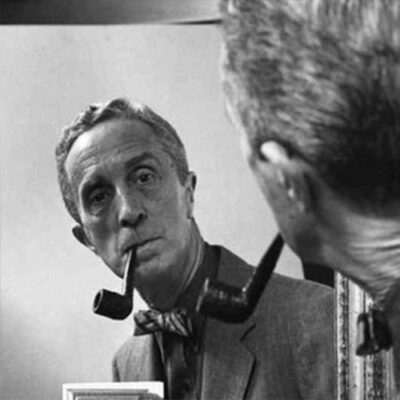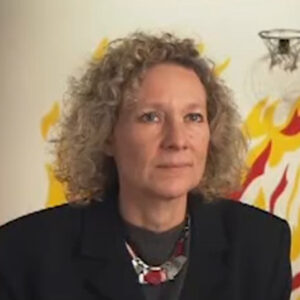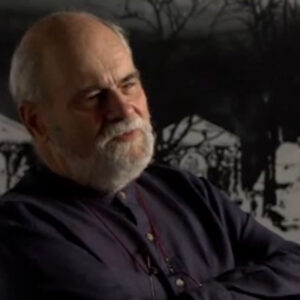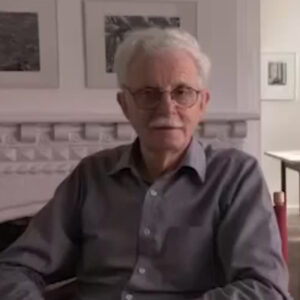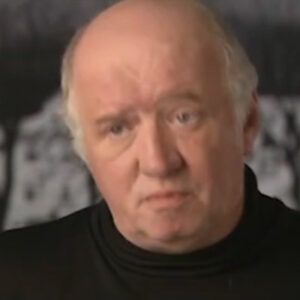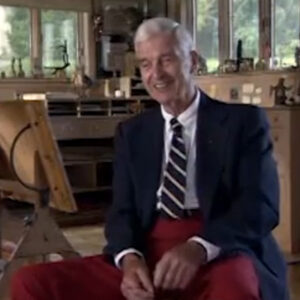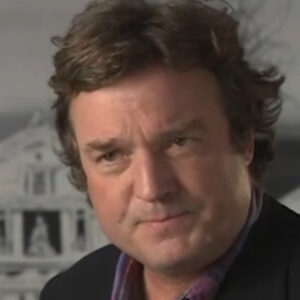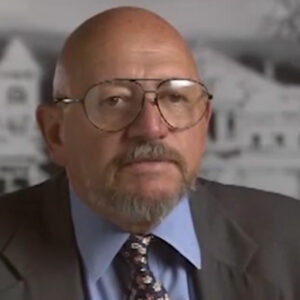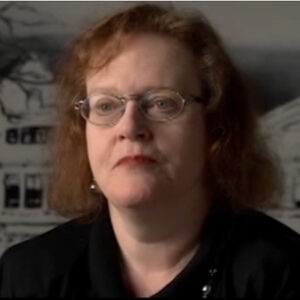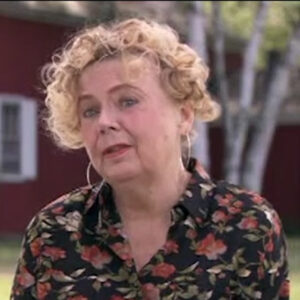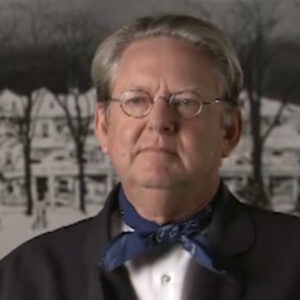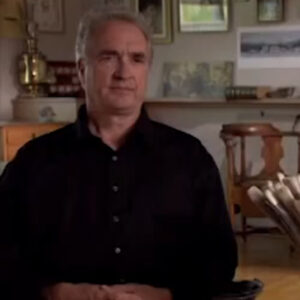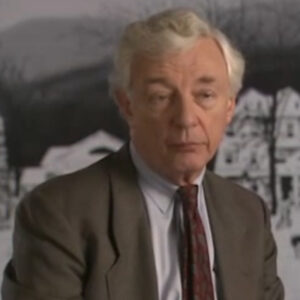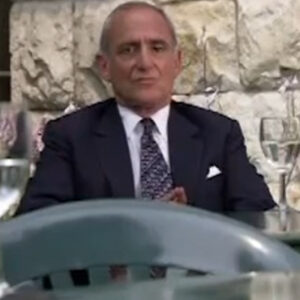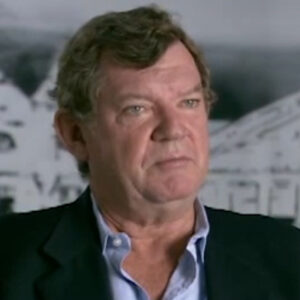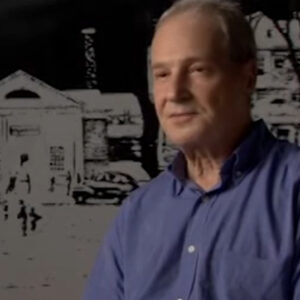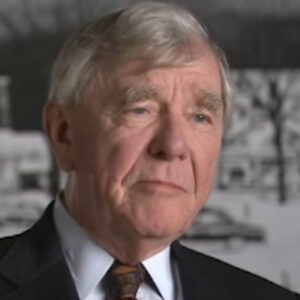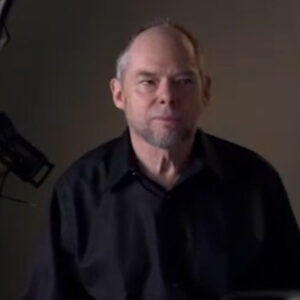Speaker Met Norman, was that a basketball game in the Arlington High School gym? And I probably was 10, 10 years old. I was in fourth grade and my family and I had gone to the basketball game because in a small community, everybody goes out to support the team. So I was seated on the bleachers with my mom and dad. And we had come to the halftime and begun the third quarter. And I suddenly wanted a Coke. So when I turned to my father and said, Dad, I want a Coke. He said to me, they only serve Cokes during the half. And with that, Coke appeared in my face. And this man said to me, here, have my Coke. And my parents turned around and thanked Norman and introduced me to Norman. And he looked at me and he said, How would you like to pose for me? Of course, I didn’t know what was happening. I just said, oh, that would be fine. And I drank his Coke. So how old were you when I was 10 years old? It was in fourth grade. So then what happened? They got you in trouble?
Speaker Well, later in that summer, in July of that year, he came to our house to ask my mother and my twin brother, Peter and me to pose for him for a Plymouth ad. So that was the beginning.
Speaker Well, you’re also 1952. What was it about your face that attracted him? Sorry. What’s going on here?
Speaker Yes. Did. I always do a TV interview. Oh, no. Well, we’ll be gone before you get out. We are right to continue here. I just want to get the door.
Speaker They were also.
Speaker Did he ever tell you what it was about you or your face?
Speaker He never told me directly what it was that really why I was attracted to him. But I read later in books why that’s not to say that he didn’t convey to me when I was with him that he was very pleased that I was the person who he was working with at that time. What did you say in box or what did you read? Well, I have read in my adult life. It’s quite a surprise that he said that I was his favorite child model, that he he could get me to do things with my face that just delighted him. At the time, I did not know that that was what was happening.
Speaker Well, tell me how he did that. What was it like to pose for him?
Speaker Well, first of all, it was an adventure. When I was posing with my mother the first time, it was much easier because my mother was there and she went first and sort of showed the way to me. But then when I would go to a studio alone, perhaps after school, I might get a phone call at school that would say be ready. Mary, Rockwells gonna pick you up after school today. When I would go into the studio, the first thing that he would say to me is come over here and sit down. I gotta show you what we’re going to do today. And generally had a little sketch and he’d tell me the story about that sketch. And of course, I was drawn into it. And I was ready to go. I think my mother had said to me, now, when you go to pose for Norman. And a little bit of word here as a child, I called him Norman. And he was probably the first adult that I ever called by his first name. But that was something that that he wanted and made known to me. So when he would say, OK, we’re ready to go. My mother had said to me, this is business. This is work. And you must pay attention. No playing or fooling around. You have to pay attention. So I was there concentrating, ready to go. And of course, it was probably just something within him that caused me to really focus in and be responsive to him.
Speaker And he showed you what kind of expression to have them?
Speaker Well, he would generally say, OK, this is what we’re gonna do. For example, in the picture of the little girl, the black eye. Well, he really set that one up. Well, he said, look, you’re you’re victorious in this picture. You’re with the little girl who beat the boys. And that was really beyond my imagination. But he said, you’re going to grin. Just think about what was going to feel like to to be the victor. And so when I sat down to do it, he literally got down on the floor, started pounding the floor with his hands and kept saying, come on, come on, come on. I want to smile. And he just started cheering me on. And pretty soon I was just able to let go. And out came the marvelous grin. Did you have a black eye on. I didn’t have a black eye. In fact, that was a very troublesome spot for him. I probably went back maybe two or three times that we just worked on the black eye. One time he put charcoal on it and smudge charcoal around here and took pictures. And that still wasn’t right. So eventually he advertised and apparently he got letters from all over the northeastern part of the United States. And eventually he chose a little boy, I think, from Springfield, Massachusetts. And this little fellow had to shiner’s. So he had his choice. So we put the boy’s black eye under you and the little boy’s black eye was painted onto I think it was my left eye.
Speaker What are some of the other ones that you do?
Speaker One of the big ones that I did that took several days.
Speaker In fact, the only one that really took several days was a day in the life of a girl. And I think there must have been maybe between 12 and 14 different poses for that. So we did that over a three day period, as I recall. And those were long days. I would probably be there at eight o’clock in the morning and we might work through to 2:00 or 3:00 in the afternoon. And some of those poses I had to go back and redo. But for the most part, I might just do a pose once. And that was satisfactory to him.
Speaker He was really a perfectionist. Can tell?
Speaker Oh, I think so indeed. Now, as a child, I wouldn’t have known that.
Speaker Sorry, because nobody heard the question. You knew you didn’t hear my.
Speaker Oh, I was a perfectionist. So you think he was OK?
Speaker Yes, I think he was a perfectionist. He certainly put great emphasis on everything being just so. And oftentimes when I went, he had the props all ready to go. And if it was wearing a bathing suit. He wanted a certain type of bathing suit that he knew a little girl should be wearing or he wanted the little girl to wear, he would buy it and have it there ready for me to put on the day of the posing. He might have me all set and ready to go. And the photographer would be saying, OK. And he say, Now, wait a minute. Wait a minute. And he’d go over and maybe just twist something a little bit. So he was indeed very, very focused in on detail.
Speaker So when you were in the studio, you were working with him on the photographer before you ever actually started painting, right? Yeah.
Speaker When I went to the studio, usually Jean Pelham was there. Who was this photographer? And Norman. And he was there greeting me at the door. And he would certainly just say, OK, Marie, come over here. We’re going to begin.
Speaker Were you the girl in the mirror also?
Speaker Yes, I was the girl in the mirror. And that’s really the last picture that I posed for before Norman left Arlington. And I remember his writing me a sweet note when that was going to be coming out, wrote me a little note and said. Mary, and such and such a date. I think maybe it was in the springtime. The girl at the mirror is comes our.
Speaker We have to take that again.
Speaker What follows that hotel, can we keep going?
Speaker That’s true. So just pick it up from. I was the girl in the band. I was the girl in the mirror. And remember, OK, we’re going.
Speaker I’m the girl at the mirror. And that picture was actually the last picture that I posed for. And it didn’t come out. It wasn’t published in the Post until after he had left Arlington, Vermont. In the meantime, in anticipation of the Post having that picture, he wrote me a sweet little note. And in it he said, Dear Mary, your pictures coming out such and such a date. I hope you like it. Love, Norman. And that was really a wonderful moment in my life. I treasure that moment the most.
Speaker How did you feel when those covers came out? Must have been something amazingly.
Speaker I, I, I don’t think that I could comprehend it.
Speaker And I would just simply take a quick peek at it and go on my way. And it it was maybe too much for me. The real joy was proposing was being with Norman and maybe it was just too big a thing for me at that time.
Speaker Did you know he was famous sermon, how did you think of them?
Speaker I don’t think that I knew that he was famous. You know, in our town at that time. There were several artists who did post covers and it was just kind of normal living. One of my best friends was Diana Gillespie and her stepfather, George Hughes did post covers.
Speaker So I used to be playing with Dinah and George would come along. You say you want to see my latest picture, come on in and take a look at this. So it was kind of a natural thing. And if so, I’m not sure that I really understood that he used a lot of local people, right? Yes. You know, in our village, many, many people posed for Norman. And it was not unusual to look at a Saturday Evening Post and be able to recognize many, many of the people. And over the period that he was in the village, really, our town became the the models for him.
Speaker In a way, I mean, we’re talking about how why he chose Arling term. What do you think it was about?
Speaker Arlington, Va., made it a perfect match for Arlington and Norman Rockwell.
Speaker Well, as I look over the history of of Norman and looking at his own life and where he was in his own life, coming up to Vermont, apparently he first came just looking for a spot, maybe a weekend retreat or a vacation home. But once he got there, he saw the potential for a new way of living his life. And perhaps he was at an age in his life where he was ready to embrace the beauty and the serenity and peacefulness that a village and a rural area offered him overnight, giving serenity.
Speaker The phone. Yeah, I just really wanted that. OK, well, let’s pick that up. I’m sure.
Speaker Just thinking trying to get into it.
Speaker In recent years or during the period of my life when I’ve been reading about Norman Rockwell, I came to to recognize that he came to Arlington at a time in his life when he was looking for a new way. So maybe some new energy and new scenery. He came originally to buy a weekend home or a vacation home for his family. And apparently he just fell in love with the beauty, the serenity, the peacefulness, the simple way of life that small Vermont community would offer a person. And he came in and he jumped right into it.
Speaker Looking back, that is like it changed to his work or affected his work.
Speaker Well, from what I understand in in reading and even looking at his paintings from a evolutionary period, it seems that he began to really focus in in a more intense way on what life was in America.
Speaker And there seemed to be a happy time in his life. He really wanted to capture America, living a wonderful life and reflect that back to the people of the nation. He was able to really get involved in World War Two. He wanted to offer something to our country to be a part of the war effort and to inspire the people of the nation to encourage them. And so he came out with those perhaps as his greatest paintings, the four freedoms.
Speaker What happened when he left? I mean, it seems like it must have been a sad time for people of our own.
Speaker When I think when Norman left, it was perhaps the first time that the people in the town realized that Norman Rockwell had been there. I think he was such a part of the local scene and perhaps this is what he liked. Nobody made any kind of big deal out of Norman Rockwell. And when he left, there was a tremendous sense of loss and sadness. And personally, for me, it was probably one of those points in a young person’s life when they begin to to recognize that there’s sadness. I I remember I remember my mother and father telling me that he was leaving town and it was confidential, but they wanted me to know that.
Speaker And I can remember going to my room and crying because there was something special between us. And one of the last things he told me was that there was going to be a play in town by written by Dorothy Canfield Fisher. And it was going to be performed. And it was understood. Betsy and Norman said to me, Mary, you’re the one I want to be understood. Betsy. And that’s what I’m gonna do. I’m going to see that you get to be understood. Betsy and I kind of had that dream. And that was one of the first things I remember seeing. I won’t be understood, Betsy. I won’t be in that play. So he had a had a real place in my heart. And I was I was very stricken.
Speaker Can you put into words what it was that he was, too.
Speaker Was fair. I just. So I was asking you if you could put into words what it was that Norman was doing.
Speaker What was it about your relationship that was so special?
Speaker I guess I will have to to say that over the years, I have thought many, many times about what was this connection that I had with Norman Rockwell.
Speaker It obviously was a big event in my life.
Speaker And from what I can gather at the time, it was just part of my everyday. It didn’t seem to impact me. But as I got older and began to reflect, I became aware that Norman really affirmed me and really accepted me for who I was, where I was. And he challenged me. He brought me into his whole creation. I seem to be a part of that, at least at the time. I felt that I was an important part of this creation that was going on. And so. That was great gift to me. It made me aware that you can connect with people and do things with people that creative energy.
Speaker Sorry, what’s wrong? Several people checking in.
Speaker I hear I hear all the doors are creaking as David hears this stuff. David, do you hear the doors creaking? Can you hear anything, David?
Speaker You’re hearing a vacation, not seeing each other.
Speaker Whoops. I just moved something.
Speaker It’s not a guarantee. Well, let’s give it a shot. OK. He’ll tell you.
Speaker So I was saying as we go, you have a feel for who he was as a person, you were as a little child.
Speaker I really had to. To be what Norman wanted me to be. And he had an amazing way of showing me respect and including me in the whole project. And I felt that I felt as if I were were part of this whole creation, that he wasn’t bringing me in there to order me around. But he was bringing me into the whole process. And so I felt connected to him and and to what he was about. And this was a gave me a great sense of affirmation and a sense of myself as a child. So, you know, there was a great love that I had for him.
Speaker And you must missed them a lot. I did miss him. And perhaps the good thing is, is that I was able to stay in touch with him.
Speaker I think the last correspondence I had with him was when maybe when my third child was born and I sent him a picture of my children and he sent a lovely note back saying very I’m so delighted to have your children’s pictures in my house. So this was a friendship for for life, even though it started in a just a very small way. He throughout my life was very affirming and accepting and encouraging of me.
Speaker What do your kids think about him and his work?
Speaker Oh, my children have, I think, enjoyed talking about my posing. We haven’t certainly done a lot of talk about it, but they have enjoyed it and they have pictures up. And I enjoy going to the Rockwell Museum and talking about it.
Speaker I’m just going back to when he left. Were you aware at all of his wife’s troubles at the time?
Speaker I mean, I was I was aware that Mary Rockwell was not well, and that was why he was leaving.
Speaker But that’s about all I really knew at that time.
Speaker Did he seem to you to be a happy person or did you ever get any sense of, I don’t know, family tension or sadness on his part?
Speaker Well, when I knew Norman and of course, I was a child and we were involved in the work.
Speaker I never had any idea that there was any sadness. It was only through reading his life that I was aware that he was a man who who struggled and suffered and had to work with depression in his life. But what I remember most is his great laughter had an enormous laugh. And oftentimes that was how we connected. He was he would just break down into laughter in order to get me to respond to him.
Speaker So was he, though? I don’t know. Happy go lucky Charlie character.
Speaker He was a happy person, but he was intense. I mean, this was work and somehow he was going to bring me into it. But there was an underlying seriousness and and he conveyed that as well as making it fun.
Speaker How do you think you feel about how is followed for.
Speaker I think that he would be a very happy man. I think that he wanted to bring delight to people and and he did. I think one of the things that has amazed me living in the western part of the United States for all these years, for 30 years now, I have met more people who grew up in the Midwest and who’ve told me that waiting for the Saturday Evening Post to come and hoping that there would be a Norman Rockwell on the cover was one of the most memorable moments of their lives.
Speaker I found that really interesting. And a lot of power, he surely had had a wonderful following. But I think he captured. He captured that the American life, the way people were living life and going through life. He was reflecting that to the people. And they loved it. He was part of them.
Speaker I think it really was the real America, the dream of America.
Speaker Well, it was you know, it was a little girl growing up and looking in the mirror and wondering if she would be beautiful and dreaming about her life. That certainly, I’m sure, captured a lot of young women, young girls looking at that and wondering, yeah, that’s what I’m feeling inside. I want to be have a wonderful life in and grow up or the day in the life of a girl. All the different little series of With the Little Girl did was very much what I did in my life. I went swimming. I went to the movies, went to a party. Little boy kissed me. And I think that was a just an easy way of looking at American life. I don’t think that Norman Rockwell is going to be known for the getting involved in the darker side of our culture. But that doesn’t negate the message of maybe being attuned to the simple American way of life.

